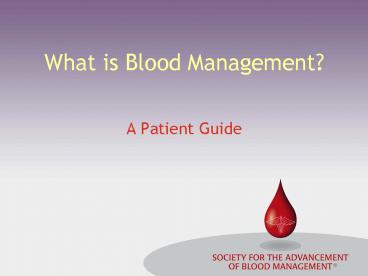What is Blood Management - PowerPoint PPT Presentation
1 / 15
Title:
What is Blood Management
Description:
Ask your doctor what options may be available to avoid a transfusion. Have your doctor explain the risks and benefits of your decision so you can make ... – PowerPoint PPT presentation
Number of Views:131
Avg rating:3.0/5.0
Title: What is Blood Management
1
What is Blood Management?
- A Patient Guide
2
Blood Management Involves
- Ensuring that every decision to transfuse blood
is made with careful attention to the risks and
benefits for each individual - Informing patients and encouraging their
participation in transfusion decisions - Using state-of-the-art techniques to avoid the
need for blood transfusion - Minimizing unnecessary sources of blood loss
- Advance planning to build blood counts
before procedures
3
Why Blood Management?
- Periodic blood shortages
- The rising cost of blood products
- Common sense Why run even a small risk of side
effects if theyre avoidable? - Availability of effective alternatives
- Increasing public interest in alternatives to
banked blood
4
Blood Supply Shortages
- Predictable drops in donations during
- Busy summer vacation months
- Holiday seasons / 3-day weekends
- Bad weather or disaster situations
- Fewer eligible donors as pre-donation questions
are added to predict donor risk for rare
infections - Changing perception of social
responsibility among new generations
of donors
5
The Rising Cost of Blood
- Health care costs are increasing faster than any
other sector of our economy Americans expect the
very highest standard of care - As new threats to the blood supply are
discovered, more and more tests are required on
every unit of blood - Enhanced quality control in blood collection
ensures the safest possible products, but
at increased cost
6
Hospital Economics
- Blood costs include more than just the cost of
collecting products - Hospitals pay to test patients before
transfusion, store blood and dispense it from the
blood bank, and give it to patients, with many
safety checks at every step - Side effects, if they occur, add costs for
treatment and longer hospital stays - Avoiding unneeded transfusions saves
all these costs and prevents unnecessary
side effects
7
Transfusion Side Effects
- Known, and emerging, infections transmitted by
blood (bacteria, viruses, unusual things like
malaria) - Allergic and febrile (fever chills) reactions
- Antibody reactions (when the immune system is
activated and destroys transfused cells or
attacks our own body) - Human error transfusing the wrong
blood to the wrong person
8
Blood Management Strategies
- Investigate a low red blood cell count (anemia)
and correct it with iron, vitamins or growth
factors - Minimize blood loss using state-of-the art
surgical techniques and medications - Use your own blood drawn weeks before, or even
during surgery, to avoid the need for blood from
others - Restrict blood drawn for lab tests
- Consider lower red blood cell
- counts for transfusion
- Discuss the risks and benefits with your
physicians
9
Hospital-Based Blood Management Programs
Philosophy
- Every drop of
- blood counts
10
Hospital-Based Blood Management Programs
Integration
- Physician leaders
- Core blood management team
- Hospital-wide blood conservation policy and
protocols - Education for physicians and staff
- Community education
11
- Blood Management Programs
- Hospital-Based Blood Management Programs are more
successful when everyone works together - Administration
- Physicians
- Nurses
- Patients
12
Hospital-Based Blood Management Programs
Before the operation
After the operation
During the operation
A TOTAL APPROACH TO PATIENT CARE
13
Patient Blood Management
Coordination and Attentionto Detail is Important
- Before surgery
- Build up your blood counts
- During surgery
- Lose less blood
- After surgery
- Continue blood-building treatments
- Limit blood sampling
14
Summary
- Blood management options should be a part of
making good health care choices - Building your blood counts up before surgery may
help you to avoid a blood transfusion - Safe effective alternatives to blood
transfusion are available - Sometimes, several blood management options
can used at the same time to avoid a
blood transfusion - No single approach (drug, device, technique)
is effective for everyone
15
What Can I Do?
- Choose a doctor who will work with you
- Know what your blood counts are
- Ask your doctor what options may be available to
avoid a transfusion - Have your doctor explain the risks and benefits
of your decision so you can make a choice thats
good for you - Check the web-site at www.sabm.org
for a list of hospitals with blood
management programs in your area































